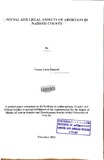| dc.description.abstract | This study sought to identify the key social factors that influence women's decisions to procure an induced abortion and the extent to which the legal status of abortion influences the decision to procure or not procure an abortion. The study's overall objective was to explore the social and legal aspects that influence a woman's decision to procure an induced abortion. The study was conducted in Nairobi County, the capital city of Kenya where 30 participants took part in the interviews. The study questions were to find out key social factors that would compel a woman to desire and eventually procure an induced abortion and to what extent the legal status of abortion in Kenya influenced the decision.
Data were collected through in-depth interviews, key informant interviews, case narratives and secondary sources.The study generated qualitative and quantitative data which were organised, tabulated and interpreted in relation to the research objectives and presented as narrative and verbatim quotes according to emerging themes. The study findings suggest that there are various socio-economic factors that influence women's decision to procure an induced abortion, a major and most common factor being economic instability. Most of the women (67%) stated that they were not economically stable to take care of the unborn. Society perception and stigma was the second most identified factor. These included single mothers' syndrome, rejection by spouse/boyfriend, parental coercion, family rejection, fear of disrupting school or employment.
The social perception and stigma were intertwined with economic instability and insecurity. The study concludes that the legal status of abortion in Kenya is not a crucial factor at the point of women making the decision on whether or not to procure an induced abortion. The distress is usually overwhelming and surpasses thoughts about the law. A key recommendation of the study is that instead of enhancing criminalization of abortion, public resources should increasingly be used in the various, but well known means of prevention of unwanted pregnancies. | en_US |

